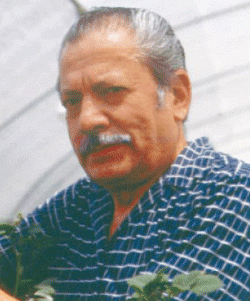 For 40 years, Peruvian plant explorer Carlos Ochoa has scoured the rugged Andean mountains and valleys in search of wild potato species. Many of the species he discovered and saved for future scientific work are now believed to be extinct in the wild—buried under volcanic ash in Colombia, scraped away by bulldozers building the Pan American highway, and crushed under the construction of slums on the outskirts of Lima, Peru.
For 40 years, Peruvian plant explorer Carlos Ochoa has scoured the rugged Andean mountains and valleys in search of wild potato species. Many of the species he discovered and saved for future scientific work are now believed to be extinct in the wild—buried under volcanic ash in Colombia, scraped away by bulldozers building the Pan American highway, and crushed under the construction of slums on the outskirts of Lima, Peru.
Before joining CIP in 1971, Ochoa was a professor of plant breeding at Peru's National Agrarian University in La Molina. In 1969, he rediscovered a potato first described in the 1830s by Charles Darwin, the English naturalist who formulated the theory of evolution. It was the first reported sighting of that species in more than 150 years.
Ochoa's explorations were often dangerous, bringing him into contact with bandits and guerrillas. One time, near the Peruvian village of Chota, a band of thieves mistook him for a treasure hunter and tried to kill him by rolling giant boulders down a mountainside. He escaped with a wild potato species by ducking under a rocky overhang. In Colombia, years ago, he managed to collect a wild potato species and escape down a mountainside before a long-dormant volcano erupted and destroyed the remaining plants.
In the rainy season, when potato plants bloom and are easy to find, Ochoa continues to trek through Andean valleys in search of still-undiscovered wild potatoes. But he believes that the chance of finding many more wild potato species is remote—that most of the uncollected ones have probably been destroyed by man or nature.
Of the potato species known to exist, Ochoa has discovered about a third of all the wild potatoes known—more than any man in history. Recently, a newly described wild relative of the potato was named after him by scientists at the University of Connecticut. Solanum cochoae is believed to have heat-resistant properties and could prove to be a source for breeding tropical potatoes. It is the third wild species to be named after Ochoa.
In 1992, Professor Ochoa was named winner of the Organization of American States $30,000 Inter-American Science Prize. He has also received the Distinguished Alumnus Award from the University of Minnesota for his significant contribution to the genetic improvement of potatoes. Ochoa, who began his work at the National Agrarian University in La Molina, is a Scientist Emeritus at CIP and winner of other important prizes and recognition. He is a fellow of both the Smithsonian Institution in Washington, DC, and the Linnaeus Society. He currently works documenting the hundreds of plants he has collected during his career. His book, Potatoes of South America: Bolivia, published by Cambridge University Press, is considered one of the definitive works on the diversity and taxonomy of the potato. His more recent book, Potatoes of South America: Peru, offers a thorough description of about 100 wild species of the tuber-bearing Solanum. This represents nearly 50 percent of the wild species known to exist in the Americas. Almost two-thirds of these were discovered and classified as new species by the author himself.